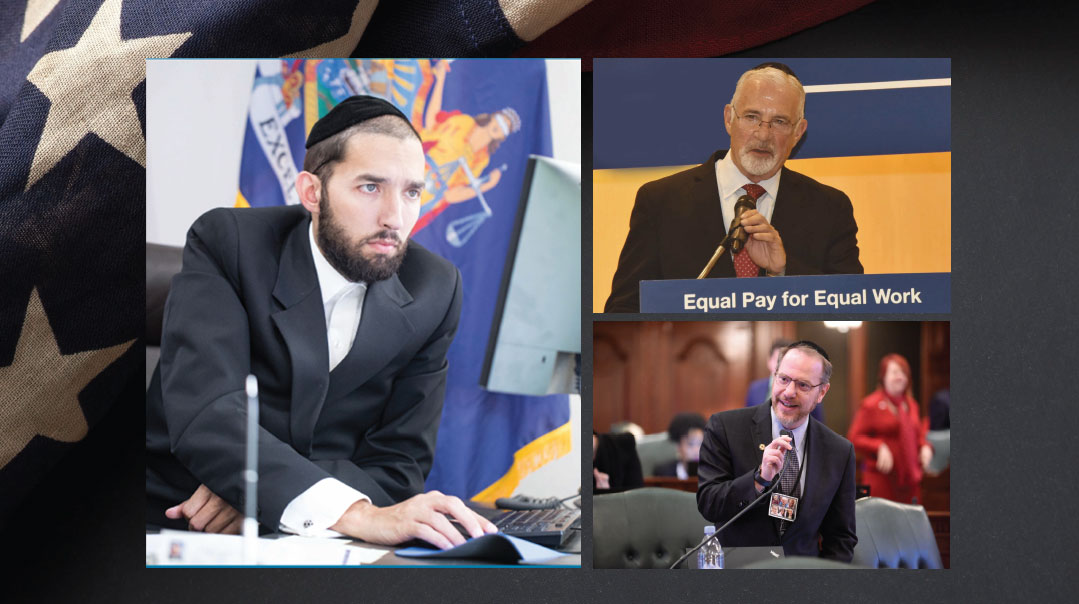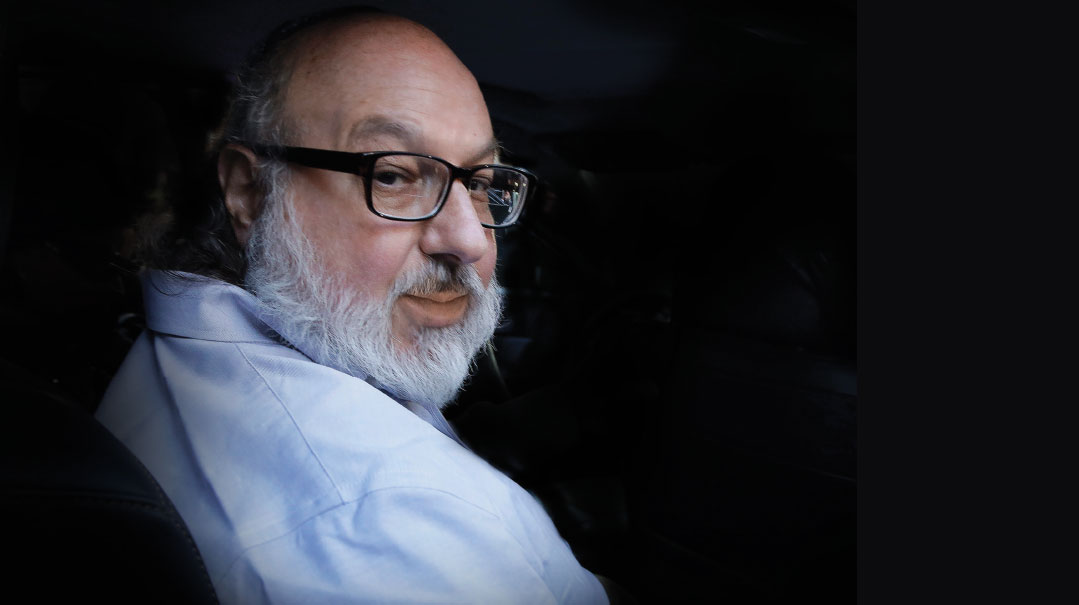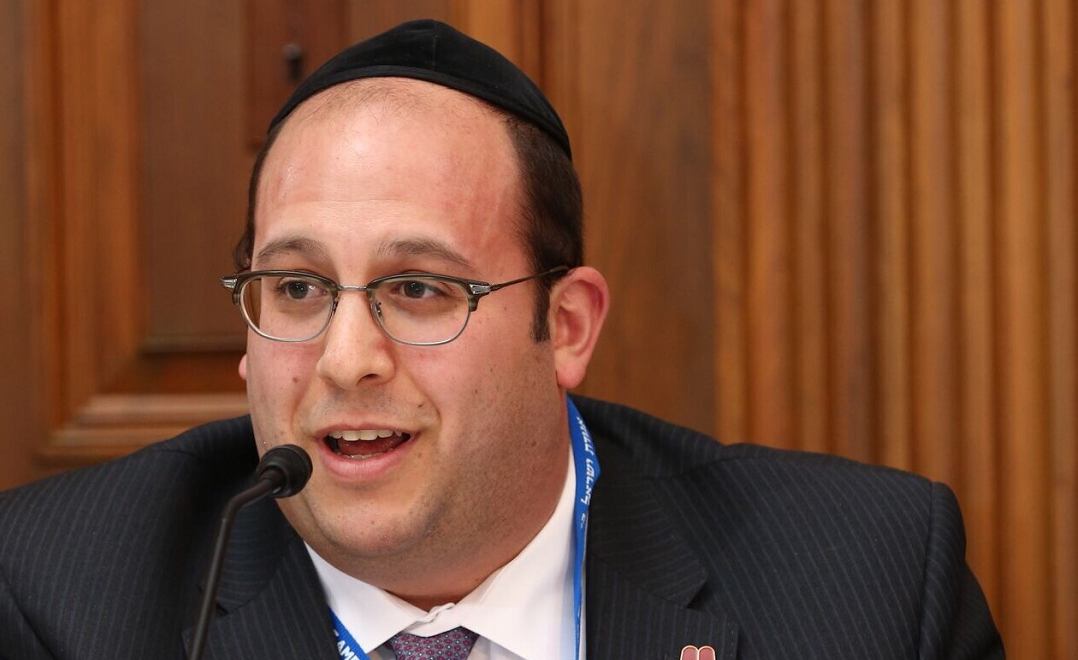Balance of Power

Three Orthodox legislators weigh in on their political balancing acts

Photos: Ben Kanter, John Berry
All professionals, at some time or another, face a clash between their own conscience and the ethics of their chosen field.
Nowhere is this more manifest than in the often grimy world of politics. Officeholders wield the power to make laws that impact the daily lives of their constituents, and consequently face pressures from an array of clashing interests, including their own political parties, lobbyists, and multiple constituencies. Holding public office calls for a juggling act between these competing interests, while trying to maintain one’s own moral compass in a world where principled positions are sacrificed on the altar of expediency in the proverbial smoke-filled rooms.
Politics is a world where morals are supposed to prevail, but malevolence often reigns. These past three years have seen heated debate in the Orthodox Jewish community over what should take precedence: the personal behavior and manner of speech of political leaders, or the actual positions they take and results they deliver.
While the whole system often seems antithetical to Judaism, Jewish values have always played an outsized role in American politics. The founding fathers drew inspiration from the Tanach and Jewish sources to frame the Bill of Rights. Jews have always held public office in numbers disproportionate to our percentage of the population. This has been a source of pride for American Jews, contributing to their confidence in the American system of government. It’s not for naught that Jews have dubbed America the malchus shel chesed.
Today, Jews, who constitute less than 2 percent of the US population, hold 36 seats (7 percent) in Congress. (Back in 1993, almost 10 percent of Congress was Jewish.) However, since Connecticut senator Joseph Lieberman retired three years ago, Congress has no Orthodox Jews.
America’s 50 states have a total of 7,383 state legislators, according to the National Conference of State Legislators. The NCSL provides a breakdown by gender and ethnicity, but not by religion. There is only a little more than a handful of Orthodox Jews serving in state legislatures, mainly in states that are overwhelmingly Democratic and unapologetically liberal. As a result, it’s almost impossible to get elected and have any political influence in these states unless you run as a Democrat, and there are going to be times where the predominantly liberal stances of the Democratic Party will be at odds with the viewpoints of the Orthodox Jewish community, which has grown increasingly conservative and Republican over the last two generations.
This year alone, Orthodox Jewish legislators found themselves having to take votes on issues such as gun control, abortion, and assisted suicides, where their own personal views — informed by Orthodox Judaism — clashed directly with the far more liberal viewpoints of the vast majority of their constituents.
How did they hold up to these political challenges and personal tests of their mettle? What strains and conflicts does an Orthodox Jewish legislator feel serving in a legislature where Democrats have veto-proof majorities, and then coming home for Shabbos and sitting in shuls where the overwhelming sentiment favors President Trump and the Republicans? Overall, is politics a suitable profession for a nice Jewish man or woman?
To gain clarity on these issues, we assembled a panel of three Orthodox legislators, of three different religious stripes, from three major states — New Jersey, Illinois, and New York. New Jersey state assemblyman and Passaic city councilman Gary Schaer is the veteran of the group and a member of the same Young Israel of Passaic-Clifton that I attended when I was a boy. The other panelists are first-term legislators who brought a wealth of political experience with them to their posts: Illinois state representative Yehiel Kalish of Illinois, a veteran political operative at Agudath Israel of America; and New York state assemblyman Simcha Eichenstein, a Bobover chassid who worked as a senior aide in both New York City and state government before winning election to public office last year.
Gary Schaer
Schaer, 68, is a 14-year veteran of the New Jersey General Assembly. He serves the 36th District, which covers Passaic and 14 municipalities in adjacent Bergen County. A former chairman of the state budget committee, Schaer leads a double political life, having served for the past 25 years as a member of the Passaic City Council. Schaer holds a degree in political science from American University and also served as vice president and investment consultant for a private client group.
Yehiel Kalish
Rabbi Yehiel Kalish, 44, was appointed to the Illinois House of Representatives 16th District in January 2019, after his predecessor retired. The 16th District includes the Orthodox neighborhoods of West Rogers Park and Lincolnwood, as well as parts of Peterson Park and Skokie. He earned semichah from Bais Medrash L’Torah in Skokie, and served eight years as national director of government affairs and five years as vice president of development and state relations for Agudath Israel of America before moving back to Chicago to establish the S4 Group, which provides business consulting and lobbying services.
Simcha Eichenstein
Simcha Eichenstein, 36, won election to the New York State Assembly last November. He represents District 48, which includes the predominantly Orthodox Jewish neighborhoods of Boro Park and Midwood in Brooklyn. He previously served as senior advisor to New York state comptroller Thomas DiNapoli, and was director of political and governmental services for New York City mayor Bill de Blasio.
Gentlemen, let’s begin with a general question. Your jobs entail a big balancing act, between multiple constituencies, including your own Orthodox communities, and legislative power, which puts a premium on party loyalty. At the same time, you were elected to take principled positions. My opening question is, since this is a lot to swallow at any one time, how do you keep your balance?
GS: It is an extraordinarily difficult path that the three of us have taken, in terms of constant balancing. Obviously, there are several issues that are fundamental, and then there are issues that are not. The point is to distinguish between the two. In New Jersey this year, we had a bill that would provide for doctor-assisted end of life. Many of us refer to it as the suicide bill. There have been numerous times when I’ve abstained, but there have only been two times when I have voted against a Democratic-sponsored bill. That was one of them. The issue was so absolutely fundamental. In terms of other bills, the question is what path does one follow.
My district is also very diverse. Thirty percent of my district is the city of Passaic and 70 percent are in parts of Bergen County. In Passaic, where I live, 76 percent of our population is Latino. Jews represent about 6 percent of my voting base. So I’m not an independent, as much as I perhaps would like to be at times. I’m a member of the Democratic Party, and although I’m very strong because of the support I have here, regardless of political affiliation, nonetheless I must be nominated by the party. There is no doubt that if I were not nominated, the chances of winning a primary would be difficult.
YK: It’s a little bit different for me because I’m not an elected official — I was appointed, and at this point, we’re now working through our first election campaign. To answer your question as it relates to party loyalty, it’s about responding to the Democratic voter base in the 16th District of the state of Illinois. The people of my district speak 72 different languages, so I probably represent one of the more diverse districts, not only for an Orthodox Jew, but in the country. There are going to be constituent or advocacy groups that are not necessarily going to be so happy with the positions that I’ve taken. But I just try to remain true to who I am as a person and what I think is best for the state and the district.
SE: The dynamics for me are a bit different, coming from the state of New York, where Democrats control both legislative houses and the governor’s mansion. In the State Assembly, where I serve, there are 107 Democrats out of 150 assembly members.
My loyalty is to my constituents. There have been a lot of tough votes for me. I have voted against my conference — I don’t know if it’s more than anyone else, but it’s certainly up there. The way I view this is, be respectful and engage with your colleagues. They may disagree with you, but you always want them to know where you’re coming from. I would say that for the most part I represent a predominantly Orthodox Jewish district. Having said that, I do have other ethnic groups, mainly Italians and Asians, and we’re aligned on a lot of these issues, whether it be private schools or social issues, and on those, I don’t think we’re misaligned with the mission of the Democratic conference.
Over the past couple of decades Orthodox Jewry has become more affiliated with Republicans, and today, many are very avid Trump supporters. How has that trend affected you as Democrats in relations with your constituents?
GS: It’s an extraordinarily difficult issue, especially when so many things that Trump does specifically regarding Israel have been positive — things that, by and large, the Democratic Party itself once supported, but [it now] seems to have gone adrift. I caution people that I have no control over foreign policy, and I emphasize to the people of my district what I’ve been able to get on their behalf. Within the Jewish community, we’ve been particularly successful in a number of areas, including security funding for all parochial schools. We work closely with Catholics, Muslims, and with everyone that we can work with on the issue.
But clearly to distinguish, I frankly stay as far away as I can from Trump as much as humanly possible for a number of reasons, most assuredly in terms of [how] I disagree so much with most of what he does believe in, while acknowledging that his positions in terms of Eretz Yisrael are at times extremely attractive. And I wish they’d been adopted by my own party.
YK: I agree a lot with what Gary is saying. I gave a town hall to a large group from one of the Agudah shuls here and was asked what my biggest election challenge will be. I answered, convincing members of my community to pull a Democratic ballot at the primary. Because, as you said, many people in our community identify as Republicans, and they are strong Trump supporters.
Part of our message is that if you should choose to vote for Mr. Trump in the general election, you’ll have that opportunity, but my name will not be on the Republican ballot in the March primary. And in Illinois, you can choose what party primary to vote in when you walk into the voting booth. You don’t have to declare prior as you do in New York. So it’s a huge challenge, because of the popularity of the president within our community — a popularity that is not unfounded as it relates to Israel, as Gary said, but as it relates to other issues, I think we should be more critically thinking as a community.
Yesterday I was passing around my petitions to get on the ballot, and a frum gentleman didn’t want to sign my petition because I would not support President Trump. I said to him, “I’m your state elected official and these are the different issues I work on for you in the state legislature. I have no impact on federal government.” Nevertheless, because I was a Democrat and not a Trump supporter, he would not sign my petition.
SE: As my colleagues said, and as a member of the state assembly I am not involved in international affairs and quite frankly, I don’t begin to understand the nuances of global affairs. So I usually do not get involved in any national campaigns or national politics. But we’ve actually seen here in Boro Park and Midwood, and this predates Trump, is a lot of people registering as Republicans and voting Republican.
I’m not going to tell anyone how to vote. In New York City, whether you like it or not, the reality is that most elections are decided in a primary, and if you register as a Republican, you are taking yourself out of that process. We are right now fighting for the heart and soul of the Democratic Party. Here in New York, moderate Democrats are being challenged in primaries by socialists. Not progressives, socialists. As for the definition between the two of them… I don’t think even they know.
Having said that, it is critically important that we participate in that process. Again, I’m not saying don’t vote Republican in a general election. If you choose to do so, you will have the opportunity to do that in November. But we’re a community that has a lot of needs at the local level. It matters who the mayor is, who the local council members and state senators and assembly members are. We need allies in Albany and at New York city hall.
YK: I’d like to pick up on what Simcha is saying and what Gary said earlier. In Illinois, the current legislative makeup in the house is 74 Democrats and 44 Republicans. We call that a veto-proof majority. But what I’ve seen within the legislature — and I don’t know if you both have seen the same thing — is that members don’t necessarily want to pass party-line legislation. Our leadership tries to encourage us to pass bipartisan bills. So therefore as much as possible we should try to work with the other side of the aisle.
That being said, like Simcha was saying, we have a strong far-left progressive group that is challenging any Democrat, not just me. We’ve now seen at least 15 Democrats who will be challenged in primaries from the left. And if our community doesn’t get the message how important it is that we have our own elected officials in that chamber to moderate and to make sure that our community is protected from these attacks, then Illinois will be much further away from the center than we can even imagine it is today. Which is a scary prospect.
Gary, Simcha, do you see that in your states as well?
GS: Without a doubt. I often say to people if you want the truth, go to your shul, go to your mosque, your temple, wherever it is that you go, but don’t seek it in politics. Within the Jewish community, G-d bless us, we sometimes seek a certain purity that others don’t feel the need to accept. This purity means no compromise, which means things must be this way and only this way, and there’s no other interpretation. And I think that [for us] as a community, that is not a positive thing.
The realpolitik is such that all three of us need to operate within the Democratic Party, which has been the majority party not for one term, or two terms, but for several. Politics is about compromise, politics is about working with others, politics is finding a way where one can be happy with and champion some issues, and on others, to tone down or to change legislation that otherwise would occur, as Yehiel said, and make it more in keeping with things that we as a community believe in.
I have a little bit of an outsized presence in the state, and frankly that presence has been very helpful in passing legislation that we wanted as a community, moderating some legislation that otherwise would have been totally antithetical to what it is we subscribe to.
SE: There’s a famous quote from Ed Koch, former New York City mayor: “If you agree with me eight out of ten times, vote for me. If you agree with me ten out of ten times, find a psychiatrist.” The reality is that we need to vote in the Democratic primary. We need to participate in that process, because the reality is that in my chamber, in the Assembly, the Democratic majority — the conference — decides the agenda. We need to advocate and work with our Democratic colleagues in the conference. As a community, we need to vote and elect moderate Democrats.
I have many colleagues that I don’t agree with on X, but I agree with them on Y. There are so many colleagues that we are aligned with on social services and criminal justice. Then comes another issue where perhaps we’re not aligned. The fact that I don’t agree with someone 100 percent of the time does not mean that we cannot find alliances on other issues that are vital to our community.
In the past year, Illinois and New York passed major revisions to what’s called, in both states, the Reproductive Health Act [RHA], liberalizing abortions. Yehiel, I’ll start with you, because for you this was a real firestorm, and you’re still working on dousing the flames. Your broad constituency is very pro-choice, and they were expecting a yes vote. Your Orthodox Jewish constituents expected a no vote. You voted “present,” which made nobody happy. Looking back, would you have made the same choice, and going forward, what will you do next time faced with such a conflict?
YK: You can’t look back at a vote that took place during the course of May and say, now that I know what I know today… It’s irrelevant. Where I was sitting on May 28 and May 29, having to make a certain decision, I believed given the information that I had at that time, the right decision was made, and I had a lot of people who I respect and love helped guide me.
I’ll share a story. Representative Jan Schakowsky, who has served in the US Congress for the past 20 years, met with me after the session to discuss this vote. She is as pro-choice as they come. She sat down across from me. I was ready for her to take out her hidden knife and stab me in the heart for my vote. What she said was probably one of the most important pieces of advice that I’ve heard as it relates to being an elected official.
When she first ran for Congress, she was asked at a town hall: Would she vote her conscience or would she vote her district? As she told me the story, she said the following words: “Yehiel, I lied. I told the audience that I would vote my district, not my conscience.”
And then she said to me: “I have never once voted my district. I have always voted my conscience.” And that’s really important. I have to be who I am. We have to be who we are. As it related to the RHA, yes, there were parts of the RHA that were actually good pieces of legislation that we agree with. The bill’s sponsor asked me to vote present because of that, and after talking it out with some important people I’m very close to within the community, that made sense.
And there were other parts of the bill that we really disagreed with, which is why I kept away from a yes vote. History will say that Yehiel Kalish voted present on this bill. So we have to ensure that as much as we keep our districts and our constituents in mind, that ultimately it is our name that is associated with the piece of legislation, and we have to be good with the world associating our name with the piece of legislation.
Simcha, New York passed a similar law this year. Because you mainly represent Boro Park and Flatbush with heavy concentrations of Orthodox Jewish voters, did that make your no vote on New York’s version of RHA easy for you? Or did you also face pressures to go against your conscience, if you will, and either vote present or yes, or maybe even just walk to the cafeteria when the vote was taken?
SE: Well, I did not walk to the cafeteria, I stayed in my seat. In today’s political climate, with Twitter out there monitoring every single vote and immediately putting it on social media—
YK: How crazy is that?! I get text messages from all over the world about my votes, almost immediately!
SE: Almost before I even vote, it’s on there.
GS: Can one of you gentlemen tell me how to get onto Facebook, by the way?
Gary, I went on your Twitter feed while doing research for this article, and I noticed that you have an account with no tweets. So yours is really an innocent question.
GS: I don’t have Twitter. I don’t know how to spell Twitter. I don’t know how to get on Twitter. And I think I’m better off that way.
SE: I envy you. For me, it was as simple as sticking to principle. I’m opposed, representing a constituency that is opposed as well. I stick to my principles and voted no.
Gary Schaer, RHA wasn’t much of an issue in New Jersey this year, but as you mentioned at the outset, the assisted suicide bill was. The bill enables terminally ill patients to obtain a prescription under certain conditions, giving them the option of taking it to end their own lives. You voted against that, even though a very close friend and colleague of yours, Assemblyman John Burzichelli, was the sponsor. Did that give you anxious moments?
GS: Assemblyman Burzichelli, who is a very close and dear personal friend, has been sponsoring the bill for a number of years. He came to me a number of times and asked if there was any way that he could get my vote, and my answer was categorically, unfortunately, no. And I say unfortunately, because I didn’t want to hurt John, and I want to respect what he invested into the legislation, but on the other hand the substance of the bill was something that is totally not supportable. He asked if I could abstain on the bill, and I told him that I believed the bill was so reprehensible that I would have to vote against. And again, it’s only the second time that I’ve voted against a Democratic bill. He asked me as a matter of personal favor if I would not speak against the bill on the floor. That, I did agree to do.
Do you think that had you spoken out, it might have halted passage, or did you feel support was so overwhelming that it would have been a waste of time to speak?
GS: I don’t think it would have been a waste of time. I think I could have made a case that might have made some people reconsider their vote. But so much of what we do is looking back and wondering what it is that we could have done better.
Yehiel, you phrased it very well. I did the best I could on the bill. Did I do something fundamentally wrong by not speaking out against it? One could make that argument, and I will admit to you that I don’t sleep well most nights, because I constantly question, as I know Simcha and Yehiel do, what we could have done, what other steps we could have made in other areas, and are we really taking advantages of the positions that we’ve been given, or fought for, to the betterment of the community.
Am I comfortable with my no vote on assisted suicide? Absolutely. Am I comfortable that perhaps I could have done something to dissuade others from the vote? It’s possible, but I think highly unlikely.
Let’s move on to another controversial issue in the frum community, and one that each of you has been instrumental in sponsoring during the most recent legislative session — gun control. We’ve had an increase in mass shootings, increases in anti-Semitism, and threats to Jewish institutions. On one hand, you’re all in very liberal states with broad constituencies demanding tougher gun control, while at the same time, Orthodox Jews are arming themselves in self-defense. How do you reconcile the two needs?
YK: In Illinois, a few years ago, they passed what they call the Concealed Carry Law. That allows people to not only own weapons, as the Second Amendment allows, but you can go through a 12-hour course and become a concealed carry owner. I will tell you that a large number of men and women in our community have passed the test in Chicago and are carrying. And one of the challenges within the community were people participating in Kiddush at shul while carrying their weapons. Which is obviously against the law, because you cannot have alcohol in your system and carry a weapon.
At the same time, when speaking to some security experts, their greatest fear as it relates to shuls is with the number of people that are actually armed, innocent people could possibly be hurt in crossfire. Which is why our community — and I think other communities should do the same — has an organization called CCL Shul that works together with rabbanim, gabbaim, or somebody in authority who knows who is carrying a weapon at all times within the shul, and [knows] that the group is actually coordinated. Just like you [train during] a fire drill, that group of people cleared to carry in shul actually train together as a group.
So I’m all for the Second Amendment. Someone who wants to go through the 12-hour course to become a CCL member in the state of Illinois, great, but we need common sense gun laws. Getting guns out of the hands of good people is not going to prevent crime. We do need to have mental health laws. We need to make sure that the wrong people don’t get their hands on guns, and we need to make sure that we ourselves are well protected.
Gary, in New Jersey, you sponsored bill A1695, and that bill also covers some of the same ground that Yehiel spoke about, although it only allows one person to carry a handgun for the purpose of protecting religious attendees.
GS: Number one, I am categorically, absolutely, against guns. Categorically. Two, there is an exception, and that is, I did write the bill you refer to after the slaughter in Pittsburgh, out of total frustration, that would allow, as you said, one person within a religious institution to carry a firearm. In terms of the greater specifics of that, that would be worked out with the state attorney general’s office.
But let me share with you my concern; in addition to serving in the state assembly, I serve on the Passaic City Council. My real fear about guns is not crossfire. One thing I’m even more concerned about is a false sense of security, which we might feel that we have by walking into shul and there’s one of our chevrah with a pistol.
My real fear is on Shabbos afternoon, when people are out strolling with their wives and the baby carriages, and some crazed person comes and takes out a rifle and begins shooting. We can protect ourselves in the shul, hopefully. We can protect our kids in yeshivos, hopefully. But what do we do when the kids leave? And that becomes the inherent problem. Now should that preclude us from doing something? Of course not. But I think that we need to understand the real limitations that we have here.
New Jersey has the most draconian anti-gun laws compared to any other state. The problem, of course, is that a guy can buy a gun in Pennsylvania or perhaps New York and schlep it here. The issue for me is not the shuls — although I did write that legislation out of frustration, because I don’t know what else to do. And I’ll admit that.
I should also add, just as a last note, that my son is a police officer. So perhaps my feelings towards this issue might be colored by his experiences as well.
Simcha, in New York you were a primary sponsor of the bill to prohibit manufacture, sale, or ownership of untraceable 3D firearms. That’s also a technology issue as well as a security risk. But certainly in Boro Park and Flatbush, where anti-Semitic incidents are becoming all too commonplace, how are you balancing demands for gun control with the need for us to protect ourselves?
SE: Yes, unfortunately we have seen a major uptick in anti-Semitic hate crime incidents. I, too, am opposed to guns, and to be honest with you, I can’t understand how this is still a debate in this country. There’s no reason in the world why anyone needs a semi-automatic weapon that shoots out 60 bullets a minute. We can also agree on background checks. There are people who have mental health issues that should never obtain a gun. Having said that, in New York a couple years ago they passed one of the toughest gun laws in the country. Yet, as Gary said, most of the guns involved in criminal activity in New York come in from other states.
Now, I’m opposed to guns, but I’m not sure I agree with the way we’re connecting the two. I think we should have a right to security at houses of worship, at schools. We don’t need to put more guns on the streets. We need to advocate for additional security.
I know that some will view this as government funding for synagogues, and a violation of separation of church and state. It’s not. The US Constitution grants us the right to peacefully assemble and to worship. So we have a constitutional right, when we walk through a shul, a synagogue, a mosque, a church, wherever it is, to worship safely and peacefully. That is what we should be advocating for. I’m very, very anxious about the solution to all this being bringing more guns to the streets. That is not something that I support.
Does that include our community, too? Are you worried about congregants in shuls being armed?
SE: Look, I don’t think you could look at it as a community thing, that this community could have guns, that community can’t have guns. That’s not how we legislate. There should be no guns on the streets, and we should have security protecting us.
Gentlemen, final question. Often during my tenure at Mishpacha, when my colleagues on the editorial board have discussed politics, I often remark that politics is a grimy business, and you all seem to be working hard to keep your hands clean. Is this a business for a nice, frum Jewish boy to get into? Would you let your son get into politics?
GS: So, my response is more than slightly colored by the fact that I’m the first frum Yid to be elected on a statewide basis. Let me also share with you that a few years ago, I decided that I could not keep my real job [in finance] and do my two governmental jobs. It was just too much, and the question was, do I make a living or do I do government? Government can be a source of so much consternation. On the other hand, it can also be the source of so much fulfillment in terms of getting things done that are a benefit to our community, to our district and to our respective states.
There are some things that I’ve done that I’m not particularly happy about, nor proud of, and yet there are other things I’ve done that far outweigh those. A few years ago our public schools were given $225 per child for school security funding. Parochial schools were given nothing. Over the past four years we’ve negotiated with the state of New Jersey, which now gives $22.6 million, or $150 per child in security services for parochial and private schools. So I look at government as an opportunity, and a necessity. It is there. The question is how can we best influence it for the benefit of our communities that comprise our various districts.
There is no choice as far as I’m concerned. We must have a presence. Of course, the question becomes, what is the proper and appropriate presence? There is also something that we’ve not touched upon, and that is, forgive me, the burden of responsibility. When people see us walking in the statehouse, on the streets, when they hear us talk — for them, they are hearing a representation of Orthodox Jewry as a whole. That is a tremendous burden, a tremendous responsibility, to make sure that one’s language is always appropriate, that one’s positions and ideals are always appropriate, as they should be.
In 25 years on the town council, and now concluding 14 years in the assembly — I am up for reelection in November, and indications and polls are very positive that we’ll win — I take nothing for granted. But certainly it has been a privilege. All politicians will tell you that it’s a privilege to serve. When you’re one of a few Orthodox Jews in the entire legislature and when you’re given the opportunities that I and Yehiel and Simcha have been given, it really is just overwhelming and unbelievable, and beyond words of appreciation and thanks to so many. Remembering nonetheless, [even with] all these glorious things, that sleeping through the night can be a challenge.
YK: I am definitely going to agree with that sleeping comment. It is definitely a challenge. I remember when Gary was elected. I was working for Agudath Israel at the time, and I remember very clearly, Agudah’s chief counsel Mordechai Biser dropping off a package of faith-related legislation that we’d been trying to move through New Jersey for years. Things that we had gotten passed in other states maybe ten years earlier. Gary knocked off our whole list in his first term as a state representative.
If there is anything I learned from that one session in 2006, it is what one member who really cares about our issues and our community could accomplish. Looking back at my first session in office, I took the Gary Schaer approach that we have to be unabashedly there for our community, similar to the way other groups are unabashedly there for their communities. And yes, it is exceedingly painful and difficult at times. We’re getting whacked from the left and the right. I wonder how David Greenfield made it through all those years in the New York City Council. Because I can’t imagine what it was like, but when you have people like Greenfield and Gary and Simcha Felder to look up to, I believe that it’s important and it’s a responsibility to serve.
Does that mean that we should serve long term? That’s a different question. Each member has to figure out how much he can handle. I lost my rosh yeshivah this year — Rav Avraham Chaim Levin ztz”l passed away right before I was appointed. For a few months I was looking to aseh lecha rav. I found someone, and I need to keep that private, because I’ve already added to the indigestion of Rabbi Chaim Dovid Zwiebel, and anyone else associated with Agudath Israel since I became a member of the statehouse, so I don’t need to point out the name of another rosh yeshivah who will get hours of phone calls based on decisions that I’m making.
But I was speaking to this rosh yeshivah recently, and he made a very similar statement to what Gary said. He said that you’re the rabbi. Whether you like it or not, everyone refers to you in the legislature as Rabbi. Before one of my colleagues introduced me one day to give the invocation on the floor of the assembly, he introduced me first as Rabbi Kalish, and then he corrected himself and said Representative Kalish. I said no, we should take the higher calling, which is rabbi. And that’s a burden of responsibility that weighs exceedingly heavily on me. My goal is to serve as long as I can, and to inspire a generation in the way Gary inspired me, so that we can inspire a younger generation, to both run for office and serve honorably.
The ability to protect our community from legislation that would have impeded our ability to practice our faith as described by the Torah, and the ability to ensure the expansion of important financial programs, like the Invest in Kids Tax Credit Scholarship, and others, keeps me motivated every single day.
SE: This job is very overwhelming, yet very fulfilling. There is no better feeling than being able to accomplish something. In just the first couple of months of my first term, I had major accomplishments in the state budget and the fight for securing funding against hate crimes. There’s no better feeling than being able to help a constituent, whether it be with a bureaucratic agency or with a utility company.
The accomplishments that I was able to make in my first year included qualifying summer camps for security funding under the grants program Securing Communities Against Hate Crimes. I got my first piece of legislation passed in both chambers — in the Summer Youth Employment Program exempting the money earned from families’ annual household income, to ensure their families would not be disqualified from other aid programs. That affects thousands of people in our communities.
Having said that, it comes with an enormous amount of responsibility — walking around in Albany with a yarmulke on your head and a long rekel. The responsibility is on me to make a kiddush Hashem, because people will look at the way I conduct myself as a reflection of a larger community.
But to answer the specific question of if I want my son to run for office, the answer is: absolutely not.
(Originally featured in Mishpacha, Issue 781)
Oops! We could not locate your form.












